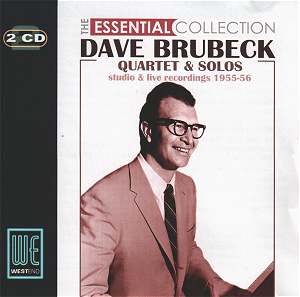CD1
1. Audrey
2. Jeepers Creepers
3. A Fine Romance
4. Stompin' For Mili
5. Brother Can You Spare a Dime?
6. Keepin’ Out Of Mischief Now
7. Pennies From Heaven
8. Why Do I Love You?
9. When I Was Young
10. In Your Own Sweet Way
11. One Moment Worth Years
12. The Duke
13. Two-Part Contention
14. Swing Bells
15. Walkin’ Line
16. The Waltz
17. Weep No More
CD2
1. In Your Own Sweet Way
2. Two-Part Contention
3. Take The “A” Train
4. I’m In a Dancing Mood
5. Balcony Rock
6. Out Of Nowhere
7. Le Souk
8. Take The “A” Train
9. The Song Is You
10. Don’t Worry ‘bout Me
11. I
Want To Be Happy
Dave Brubeck - Piano
Paul Desmond - Alto sax
Bob Bates - Bass (on CD1)
Norman Bates - Bass (on CD2)
Joe Dodge - Drums
There
was a time when some critics scoffed at Dave
Brubeck, unhappy with his thumping piano style,
his experiments with different time signatures,
his classical influences and even his popular
appeal. Now that he is over the age of 80,
he is well established as an elder statesman
of jazz and the scoffing seems to have ceased.
This is one case where ordinary fans knew
better than the critics. Brubeck found ready
audiences when he took jazz into American
colleges, perhaps because his music was accessible.
However much Brubeck liked toying with influences
he had learned from the likes of Darius Milhaud,
listeners enjoyed the catchy rhythms and the
interplay between Brubeck and his long-time
colleague Paul Desmond.
These
recordings from the mid-1950s illustrate the
appeal of the Brubeck Quartet - or, at least,
the version of it which preceded the more
technically adept later line-up which included
Joe Morello. The tracks here use drummer Joe
Dodge, who was no great technician and was
given to thrashing a Chinese cymbal remorselessly
and dropping loud "bombs" (i.e. bass-drum
beats) which appealed mightily to campus audiences.
The
first CD consists of studio recordings, while
the second contains live performances which
tend to be more exciting because the players
let themselves go and respond to the audiences'
enthusiasm. Listen, for example, to Dave's
long piano solo on Balcony
Rock, which
gradually develops patterns and structures
which most listeners can appreciate.
Credit
must also be given to Paul Desmond, whose
cool saxophone sound was an integral part
of the quartet, contrasting neatly with Brubeck's
more extrovert style. Desmond deliberately
avoided imitating Charlie Parker, as most
other saxists had done at the time, and developed
his own economical, vibratoless style. Superficially
it may have seemed emotionless, even cold,
but it was capable of conveying deep emotion.
And he often played in counterpoint with Brubeck,
the two men's lines interweaving pleasurably
as in Two-Part
Contention on
the second CD. This track also gives the lie
to those who said that Brubeck couldn't swing.
Some
"purists" may still sneer but I have enjoyed
the Brubeck Quartet ever since I used to play
a well-worn 78 rpm record of theirs every
morning before I went to school. This bargain-priced
compilation reminds me why I like them, and
why you probably will too.
Tony
Augarde
